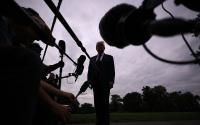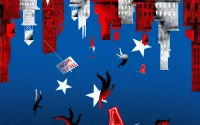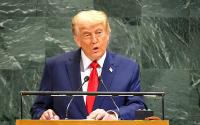17 Janary 2007Yahoo News!Laura MacInnis
The world's elite will hold discussions on climate change and the Middle East next week at their annual rendezvous in the chic Swiss ski resort of Davos, this time with few distractions from Hollywood stars.
Some 2,400 businessmen and politicians are expected to rub shoulders when the World Economic Forum starts next Wednesday, including 900 company chief executives and board chairs and 24 heads of state -- among them British Prime Minister Tony Blair and German Chancellor Angela Merkel.
While last year's meeting made media waves with appearances by stars such as Angelina Jolie and Brad Pitt, Forum chairman Klaus Schwab said there were weighty matters ahead for the 2007 gathering of political and business leaders.
"There are some very crucial issues in the world that have to be addressed," Schwab told a news briefing at the Forum's headquarters on the shores of Lake Geneva, listing climate change, energy and geopolitics as top concerns.
Noting that a few rock stars are due to attend the Davos meeting -- but Jolie was not -- Schwab said the conference was focused more on participants from traditional power circles.
"We do not need such (show business) invitations," he said. "This year it happens to be just Bono and Peter Gabriel, and I think it's right."
ISRAELIS, PALESTINIANS
Though set up to give the top brass a chance to interact in an informal setting, the Davos summit this year includes a series of discussions on climate change, energy, international trade, nuclear weapons, responses to terrorism, and challenges from demographic shifts into cities worldwide.
The Middle East is also expected to dominate the five-day meeting, which Israeli Foreign Minister Tzipi Livni will attend as well as Palestinian President Mahmoud Abbas, Lebanese Prime Minister Fouad Siniora and King Abdullah of Jordan.
There are "major plenaries" scheduled to discuss Iraq, Iran, Israel and the Palestinian territories, Schwab said.
Trade negotiators will also attend in droves. The United States, European Union, Japan, Brazil, India and others are sending top officials to try, on the sidelines, to revive stalled World Trade Organization (WTO) talks over a new tariff-lowering pact, which have been on ice for six months.
Religion, corporate branding, public health, the Internet, housing markets and macroeconomic prospects are also on the agenda, though Schwab stressed that few concrete agreements were expected to flow from the meeting.
Even on trade, where global players are under pressure to reach a deal quickly to avoid entanglements in U.S. electoral politics and European farm reform debates, little substantive is thought likely to be decided in Davos.
WTO chief Pascal Lamy has repeatedly said that the Alpine meeting "will be more geared toward process than substance."






